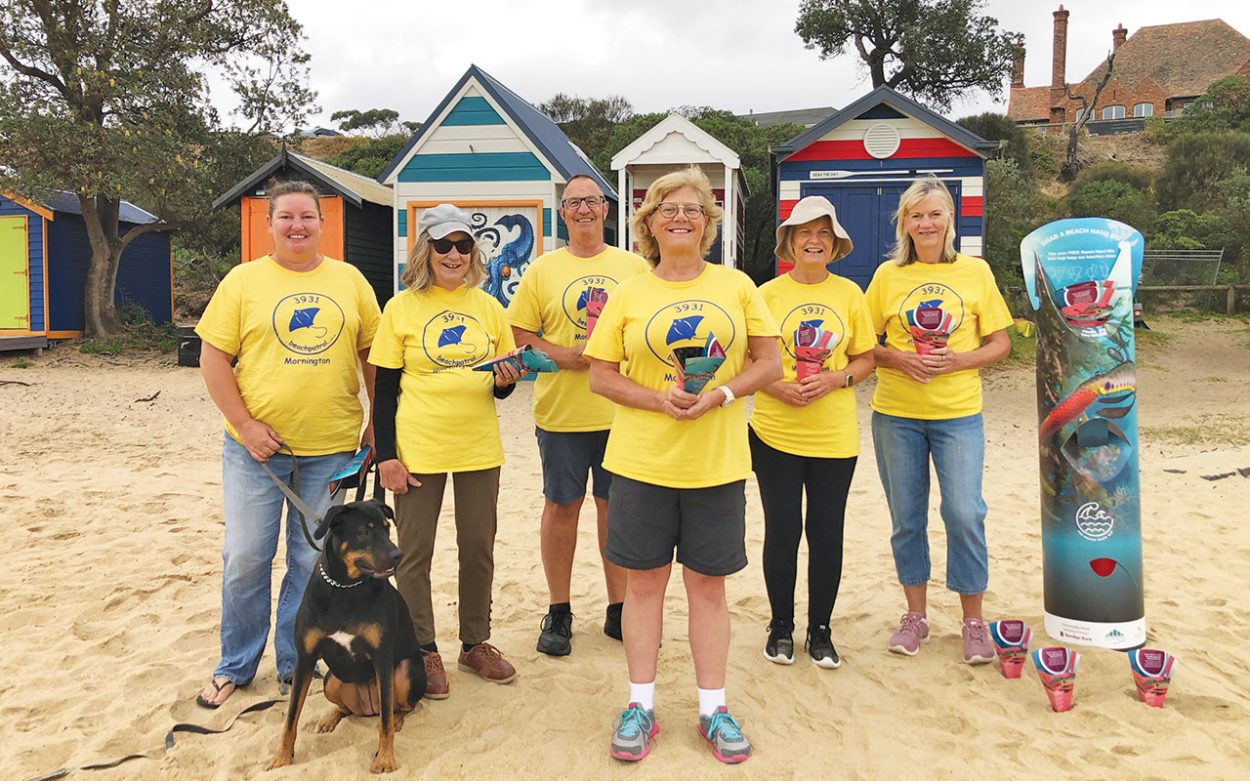MORNINGTON Peninsula Shire has put forward five options for cleaning the region’s iconic beaches following a divisive hand beach cleaning trail that has sparked heated debate in the community. The 12-month trial, which began last July, involves cleaning all Port Phillip beaches solely by hand on a fortnightly basis instead of a mechanical rake which had reportedly removed about 40 per cent of litter with plastic items being broken down into smaller pieces and buried in the sand (Tide turns for beach cleaning, The News 14/01/25).
Together with volunteers, the shire’s contractor Citywide has employed four beach hand cleaners plus a supervisor who clean 32.5km of beach from Portsea to Mount Eliza. While mechanical raking creates an aesthetically pleasing groomed look, the method has become contentious following reports it was leaving behind broken bottles, shredded plastic and needles.
Councillors will decide the future of beach cleaning at their 8 April meeting, but at this stage council officers have proposed five options using a combination of both methods with a recommendation that a ratio of 70 per cent hand cleaning and 30 per cent mechanical raking be adopted with an outsourced delivery model.
The move comes after deputy mayor Cr Paul Pingiaro voiced his concerns at the council’s 18 December meeting last year, where he called for the trial to end after noting 82 per cent of respondents to a community survey had reported beaches “are less enjoyable to visit” because of hand cleaning with increased seaweed and litter. That meeting resolved to explore all options using both methods with a report to come back by April.
According to a shire report published in March, the recommended option had “been determined on localised beach accessibility, recreational values, visitation rates, coastal setting, community sentiment and litter volumes collected throughout the first seven months of the hand cleaning trial”. This would also “reduce the amount of organic matter being disposed of to landfill, in comparison to the pre-trial hybrid method (20 per cent hand cleaning and 80 per cent mechanical raking),” the report said.
The community has been invited to provide feedback throughout the duration of the hand beach cleaning trial via an online survey.
Mayor Cr Anthony Marsh said while he was undecided about which way he would vote on the matter, he maintained “the inevitable outcome should and probably would be a compromise”. “No one was ever saying the mechanical beach rake was perfect but no rationale I think would look at this and agree that 100 per cent of hand cleaning is practical so it’s somewhere in the middle,” he said. “I think this will resolve most of the concerns that people have where you look at those high-traffic, high-utilisation beaches. They’ll get mechanical back at certain times of the year and that’s probably a sensible approach. It’s just finding a happy medium and a compromise and that’s probably landed about where it needs to land.”
Pingiaro said while too was undecided about the best approach until it was debated at the April meeting, he did believe, in his opinion, that hand beach cleaning volunteers deserved more praise.
“This is only my opinion and not that of the council, but volunteers should have been recognised a lot more. Their role in hand cleaning was extremely important and extremely undervalued,” he said.
“I’m very supportive of the fantastic work our beach patrols do, and I think the report should’ve highlighted that a bit more in my opinion.”
Award winning beach cleaning campaigner Josie Jones OAM who had initially pushed the shire for a hand cleaning trial, said she believed the 70 per cent hand cleaning and 30 per cent mechanical raking option was “premature”. “Key stakeholders haven’t been engaged, the full third-quarter data showing strong support for hand cleaning hasn’t been released, and no cost of sending seaweed to landfill compared to hand cleaning waste to landfill saving the community hundreds of thousands of dollars,” she said.
“Council itself admitted the rake didn’t work. Reintroducing it without testing not only undermines their own position but ignores state and federal plans for low-impact coastal care. “Since the rake was removed, we’ve seen biodiversity increase and protected flora reappear across all beaches and we will begin to see the true value of hand cleaning, with less litter appearing on our beaches as we come into the storm months of late April, May, and June.”
Mornington Beach Patrol leader Susan Young said as a community “we must lean away from the notion that we are picking up after other people and shift the narrative to education”. “Everyone is a steward of the environment and if we are lucky enough to live in a place as lovely as this then we are all responsible to dispose of actual rubbish and recycle and repurpose as much as possible,” she said. “It’s not up to the beach patrol groups or cafe owners offering coffees in keep cups or the council alone, it’s all of us together and playing our roles responsibly and sustainably, we will make a difference.”
As previously reported by The News, the council said that if the hand beach cleaning trial was to be ended immediately, a minimum of 90 days would be needed to change to an alternative method as per the contract. “Ending the hand beach cleaning trial immediately would result in beaches not being cleaned after the 90 days period until an alternate arrangement can be implemented,” a council report last year said. But unless council makes an alternative decision, hand beach cleaning would otherwise continue until the contract ends.
First published in the Mornington News – 1 April 2025




